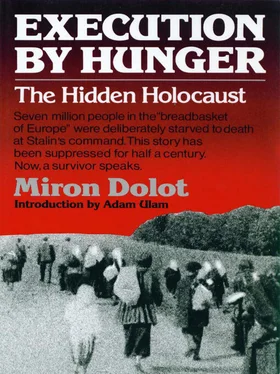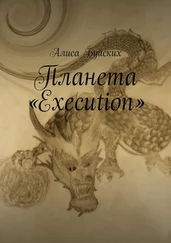The representative just sat there, blowing smoke rings, seemingly unperturbed by all these proceedings. Comrade Khizhniak looked at Comrade Zeitlin as if pleading for mercy. The latter nodded condescendingly. Khizhniak thereupon turned to the audience and mumbled his apology. He was sorry that he let his Communist vigilance relax. He assured all of us that he would never again repeat that decadent capitalist custom of addressing women first. Then he raised his paper and started reading his speech.
To our complete amazement, Comrade Khizhniak actually repeated the entire speech of the representative, including his anthill theory, and the slogan “He who is not with us is against us!” Finally came the subject we were expecting: there were enemies of the people among us; they took over some Tens and Fives, and while in their official positions, they kept sabotaging the brilliant Party policy in our Hundred and in the entire village.
At the end of his speech, Khizhniak took a paper from the table, glanced at it, and then shouted:
“Leader of the First Ten, step forward!” While the poor wretch made his way to the table, he announced:
“In the name of the Soviet People, I have the honor of arresting you for sabotaging the fulfillment of the collectivization and grain delivery quotas in your Ten.”
In like manner, he arrested six more people, among them four leaders of Tens and two of Fives. The leader of our Five, who so eagerly wanted us to join the collective farm, was among them.
As the last man was called, the door was flung open, and a GPU soldier appeared on the threshold with a rifle over his shoulder. As soon as Comrade Khizhniak finished reading from the list, the vykonavets stepped toward the arrested leaders and pointed at the door. They were still filing by the official table when Comrade Representative finished his cigarette and stood up. Comrade Zeitlin followed him, leaving the task of closing the meeting to Comrade Khizhniak, which the latter hurriedly did.
As we came outside, two sleighs were disappearing into the darkness of the winter night. One was loaded with the arrested leaders; the other with the officials. The next morning we found out that similar arrests had taken place throughout the village. From five to seven individuals were arrested in each Hundred. Since there were eight Hundreds altogether, more than fifty people had been taken away from the village in a single night.
We didn’t feel any sympathy for most of the arrested officials, but we didn’t feel jubilant either. Those people were purged as scapegoats. That much was clear. But did this mean the end of all purges? Who would be next on the list?
What actually happened next was totally unforeseen. More than two weeks passed without a single meeting. As one meetingless day followed another, conflicting rumors started circulating. Some said that the Party and government had abandoned the policy of collectivization, and would leave the farmers alone. It was also rumored that Comrade Zeitlin had left for the capital city for new instructions. Others alleged that the officials wanted to leave us alone until new jails and concentration camps were prepared for those who still refused to join the collective farms.
The most dedicated Communist activists and officials had disappeared from the village scene. Comrade Zeitlin, we also found out, had actually been summoned to the county center, but we did not know what had happened to Comrade Khizhniak, Khomenko, and others of their kind. No one had seen them in the village since the last meeting. To us it was becoming obvious that something important was soon to take place.
It was said that Stalin had recently written and spoken in defense of farmers. In his article entitled “Dizziness From Success,” he attacked local Party functionaries and activists for their overzealousness in implementing collectivization. It was rumored that he had ordered a slowdown of collectivization, and that he would even permit farmers to leave collective farms if they chose to do so. Such a rumor was hard to believe, though, for just recently we had been told at our meetings that Stalin had decided to carry through a program of compulsory collectivization by the first of May, no matter what the cost in human and material sacrifices would be. We were also informed that Stalin had announced a policy of elimination of the kurkuls as a social class. In compliance with this, the government passed a law which made it legal to banish the kurkuls from their villages and send them into exile. Could it really be possible that he had changed his mind in such a short time?
Many of our villagers did not believe these rumors, and expected the worst. However, the general hatred of collectivization and of the Party henchmen was so great that many indulged in wishful thinking and accepted these rumors as truth. All this uncorroborated information made the villagers fearful and angry.
“Where are those cutthroats?” was a question one could often hear muttered, or exhortations like, “Let’s get those damned cutthroats!” “Let’s get our horses and cows back from that cursed collective farm!”
No one would have dared to utter such words before; now they could be heard everywhere. The villagers were ready to fight and even kill if necessary. Indeed, a few days later, we saw two fires a distance away at the other end of the village. Later we learned that the headquarters of the Seventh Hundred had burned to the ground. Then the news spread that the villagers were storming the homes of the activists and village officials. We also heard that somebody had attempted to burn down the building of the village soviet; that windows had been smashed in the village club (the propaganda center); and that the telephone connection with the county center had been cut off. More than a kilometer of telephone wire was missing.
Then one night, the first murder occurred. Somebody ambushed Comrade Judas and beat him to death. Curious, as teenagers are, I ran to the place where his body had been discovered. It was still there. He was lying in a shallow gutter at the village main road. His priestly beard was singed, and his face was badly burned. The chasuble he always used to wear was missing. On a piece of newspaper attached to his chest, scrawled in slanting capitals, were the words: “A CUR’S DEATH FOR A CUR!” Finally, at the end of March 1930, we received summons to a Hundred meeting. The meeting hall was decorated in the usual way. The red banner hung on the front wall. From the ceiling was suspended a red streamer with the slogan: “Death to the enemies of the people!” The rostrum beneath it and the official table were draped in red cloth.
At the appointed time, a stranger appeared at the door with one of the members of the village soviet. The talking and the noise subsided. The village soviet member took a piece of paper from his breast pocket, walked up to the improvised speakers’ rostrum, and called for silence.
“Before we proceed with the agenda,” he read slowly, “I want to introduce to you our Party representative, Comrade Rymarenko.”
The audience showed its contempt. A man burst out laughing. Some women began to giggle. But the disruptions didn’t last long, and the audience soon quieted down.
The representative was shocked by such a greeting and visibly irritated. He stared around as if seeking assistance. Then he made a gesture of resignation with his arms.
“This is how you welcome your Party representative?” he asked in a low voice. He paused for a short time, looking down at his boots, as if trying to figure out what to do with the offenders. Then he pulled himself together and gave us a warning in a cold and brittle voice:
“As a Party representative, I will not have the Communist Party held up to ridicule.” He stopped for a moment, holding the audience’s attention with his hypnotic stare. “Laughter and giggling,” he continued, “are among the well-known ways the enemies of the people disrupt constructive meetings of Soviet patriots….”
Читать дальше












